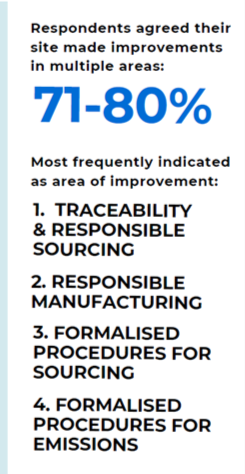The following hypothesis was investigated: ‘MarinTrust activities lead to improved or protected environmental parameters.’

Key findings
 The evaluation examined the extent to which MarinTrust activities lead to improved or protected environmental parameters. It investigated both MarinTrust Certification and the Improver Programme and involved surveys, interviews, market research, and legal reviews. The findings indicate that these activities have led to the most pronounced improvements in responsible traceability and responsible sourcing of fishery materials. This included the addition of formal policies and procedures for relevant activities in the factory.
The evaluation examined the extent to which MarinTrust activities lead to improved or protected environmental parameters. It investigated both MarinTrust Certification and the Improver Programme and involved surveys, interviews, market research, and legal reviews. The findings indicate that these activities have led to the most pronounced improvements in responsible traceability and responsible sourcing of fishery materials. This included the addition of formal policies and procedures for relevant activities in the factory.
The evaluation also found that customers play a significant role in driving engagement with MarinTrust activities, with 71% of customers asking for MarinTrust-certified materials. Other stakeholders, such as shareholders and direct competitors, also influence the decision to engage with MarinTrust. The evaluation did not identify significant barriers to participation in MarinTrust activities, but further research is needed to understand the motivations and drivers of non-engaged facilities.
Overall, the findings suggest that MarinTrust activities contribute to improved environmental parameters in marine ingredient production.
The report concludes with recommendations to capture improvements, build a feedback loop, understand legal requirements, work with multiple languages, and be proactive with customers.
Scope
As the MarinTrust Standard unit of certification is the marine ingredients (i.e. fishmeal and fish oil) production factory, the focus of this initial work was on the factories. In future evaluations MarinTrust intends to include the fisheries supplying whole fish to these factories. The aim is that this initial project was to provide a strong foundation for commissioning future impact reports and also demonstrate to stakeholders that we are committed to improving the MarinTrust Programme in a transparent way.
The following objectives were included in this project:
a) Identify if (and the extent to which) the MarinTrust Factory Standard is producing the desired positive intended environmental outcomes and impacts.
b) Identify to what extent is it possible to attribute observed effects to the activity or intervention of the standard system.
c) Identify what factors could have influenced the results (factors within the control of the standard system and other external factors).
d) Identify what unintended effects (positive or negative) have resulted from the activities or interventions assessed in a to c above (a list of potential unintended effects is currently included in the MarinTrust MEL system).
The report is also available on the ISEAL website.
 The Impact Evaluation was conducted by Natural Justice Consulting's Eva van Heukelom.
The Impact Evaluation was conducted by Natural Justice Consulting's Eva van Heukelom.
The summary report can be found in the downloads section on this page and is provided in English, Spanish, French, Thai and Vietnamese.
This work was possible thanks to a grant from the ISEAL Innovations Fund, which is supported by the Swiss State Secretariat for Economic Affairs SECO.

